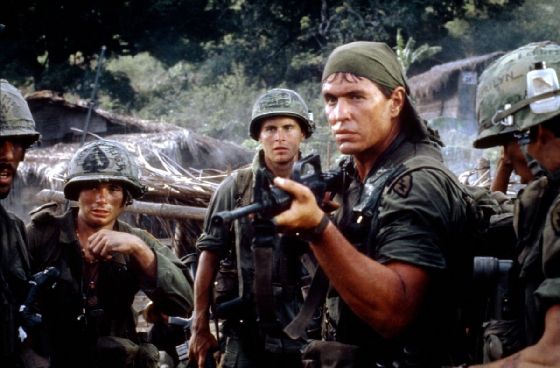Platoon (1986) 
“The first casualty of war is innocence.”

Director: Oliver Stone
Cast: Charlie Sheen, Tom Berenger, Willem Dafoe
Synopsis: A young recruit in Vietnam faces a moral crisis when confronted with the horrors of war and the duality of man.
Watch this and other movies on Sky Cinema
WARNING! – This review contains SPOILERS!
I’m surprised at how badly some aspects of Platoon have aged since its release in 1986. It still packs quite a punch — although its influence on subsequent war movies means its impact has been diluted substantially since it was first released — and there’s probably still no other war movie that captures the chaos, fear and insane exhilaration of battle the way that Platoon does, but some of director Oliver Stone’s stylistic decisions look questionable today. The first of his Vietnam trilogy (the others were Born on the Fourth of July and Heaven & Earth), it’s by far the most visceral. Based on writer-director Stone’s own memories of his time in Vietnam, it places us squarely amongst the US military’s ‘grunts’, the fighting soldiers who lived every day on a knife edge of fear with little real insight into what they were fighting for.
Charlie Sheen plays rookie recruit Chris Taylor, a college drop-out from a wealthy background who enlisted for service because he felt it wasn’t right that only the poor should have to fight, a sentiment that cuts little ice with his jaded comrades, one of whom comments that only the wealthy have the luxury of such an attitude. Sheen doesn’t really convince in the part of Taylor — he simply doesn’t possess the range required by the role — either as a green rookie or, later, as a hardened combat veteran, and his inadequate performance is a constant distraction throughout the movie.
As time goes on, Taylor slowly becomes accepted by his comrades, who are initially dismissive of new recruits as they don’t tend to survive too long, and grows to know them in a way that the audience never really does. The platoon looks up to its two sergeants, Barnes (Tom Berenger), a surly, scar-faced angry bull, and Elias (Willem Dafoe), a more thoughtful but no less effective soldier. Berenger’s brooding performance as Barnes, a man seemingly born to inhabit the arena of war and whom it is impossible to imagine adjusting to civilian life, is outstanding, and both he and Dafoe were nominated for Best Supporting Actor Oscars, although they were beaten by Michael Caine for his performance in Hannah and her Sisters.
Barnes and Elias fall out when Elias objects to Barnes shooting a Vietnamese woman he suspects of aiding Viet Cong fighters, almost precipitating a My Lai-type slaughter. This fallout between the men causes a split in the platoon which Taylor, in a sometimes pretentious narration, describes as a ‘civil war.’ It’s a rift that deepens when Taylor comes to suspect that one of them is responsible for the death of the other.
Platoon’s loose structure means that for much of the time we’re watching a succession of unrelated incidents, punctuated by scenes of grunts talking about how long they have before the end of their tour of duty. The movie sucks you in when Stone confines himself to a straightforward recreation of the soldier’s day-to-day lives, and their skirmishes with the enemy, superbly illustrating the unending anxiety of lives under the constant threat of violent death, and the unavoidable psychological damage such a life creates. But his attempt at — for want of a better word — artistry, brings the movie crashing down. His use of Samuel Barber’s Adagio for Strings, presumably designed as an aural counterpoint to what he shows us, simply doesn’t work, and distracts our attention away from the movie rather than complementing it. The narration, mostly told in the form of Taylor’s letters home to his gran — who must have really looked forward to his cheery missives about how he fears for his sanity and doesn’t think he’s going to make it — come across as the plodding diary entry of a kid rather than providing a comment on the stresses and demands placed upon an ordinary man in extraordinary circumstances. Stone also overplays his hand during Elias’s iconic death scene — influenced by Art Greenspon’s photograph (which is actually of a US soldier guiding a helicopter to the ground in Vietnam in 1968) — by allowing the scene to go on too long.
Where Platoon does score strongly, however, is in examining the stresses placed upon ordinary men on the front line. The way that ceaseless threat of a sniper’s bullet — the Viet Cong are depicted as barely visible ghosts flitting through the jungles — must constantly play on a man’s mind is captured well, so that the movie’s pivotal scene, in which the platoon is on the verge of destroying a village and slaughtering its residents, is entirely understandable. The opportunity to release that build-up of pressure arrives only during battle, which is why we see some men responding to the chaos with an exhilaration that borders on madness. It provides a stark reminder of the way it was to all those involved, and invites the rest of us to question just how we would cope in such an environment.
(Reviewed 24th April 2013)
httpv://www.youtube.com/watch?v=pPi8EQzJ2Bg
